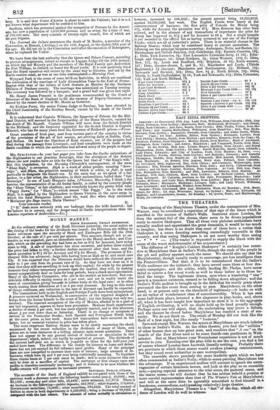THE THEATRES.
The opening of the Marylebone Theatre, under the management of Mrs. Warner, may be considered a repetition of that sign of the times which is manifest in the success of Sadler's Wells. Scattered about London, far from the ancient foci of the drama, there seem to be divers populations ready to receive Shakspere. That all these very plebeian enthusiasts have actually studied and appretiated the great dramatist, it would be too much to imagine; but there is no doubt that most of, them have a notion that Shakspere is a name denoting something exceedingly venerable in this country, and that seeing Shakspere is an act more worthy than seeing
— * * * (The reader is requested to supply the blank with the name of the worst melodramatist of his acquaintance.) The diffusion of " Knight's Cabinet Shakspere" is certainly less exten- sive at Marylebone than at Sadler's Wells, though the rank of the people in the pit and gallery appears much the same. We should also say that the Marylebonites, though equally ready to encourage, are lest intelligent than the Pentonvillians. But then it is to be remembered that the Sadler's Wells audience are the initiated; they have served some three or four dra- matic campaigns; and the critics, while lauding Mr. Phelps, have never failed to scatter a few sweet words as well to those before as to those be- hind the lamps. The legitimate drama, save when a wandering " star" gave it a transient existence, seemed to be falling down altogether; and the Sadler's Wells auditor is brought up in the faith that his sturdy grasp alone prevented the dire event from coming to pass. Marylebone, on the other hand, is at present only on the threshold of legitimacy—it looks on with an air rather of wonderment than of connoisseurship. When it has seen some half-dozen plays, invested a few sixpences in play-books, and, above all, when it has been taught how important an atom it is in the aggregate of English civilization, it will no doubt hold up its head proudly enough. Perhaps some one will object, that the undertaking may prove a failure, and the theatre be closed before Marylebone has reached a state of ma- turity. We do not think so. The result of Monday did not look like the flash of a first night, but like steady " business."
Save and except Mrs. Warner, the actors at Marylebone are much inferior to those at Sadler's Wells. At the olden theatre, you find the " utilities " of other houses shot up into great men, and recollect that "A one" on the boards of the New River used to be some, fourth-rate gentleman in West- minster. But at Marylebone your Westminster experience is not of much service to you. Dinning over the play-bills to see the cast, you find a list of names whereof London fame knoweth literally nothing. Probably there are provinces in which these names would awaken pleasing reminiscences, but they sound most unfamiliar to ears metropolitan. The ensemble shows precisely the same laudable spirit which we have often commended at Sadler's Wells; while in scene-painting Marylebone has the advantage. If an experienced auditor will consent to ignore the extra- vagancies of certain histrionic heroes, and look at the play as an ensemble only,—paying especial attention to the trial scene, the pastoral scene, and the statue scene,—he will declare that he has seldom beheld a prettier or more careful representation than that of The Winter's Tale at Marylebone; and will at the same time be agreeably astonished to find himself in a handsome, commodious, and (speaking relatively) large theatre. Altogether, Marylebone Theatre is a " fact " of the day, which all stu- dents of London will do well to witness.


























 Previous page
Previous page